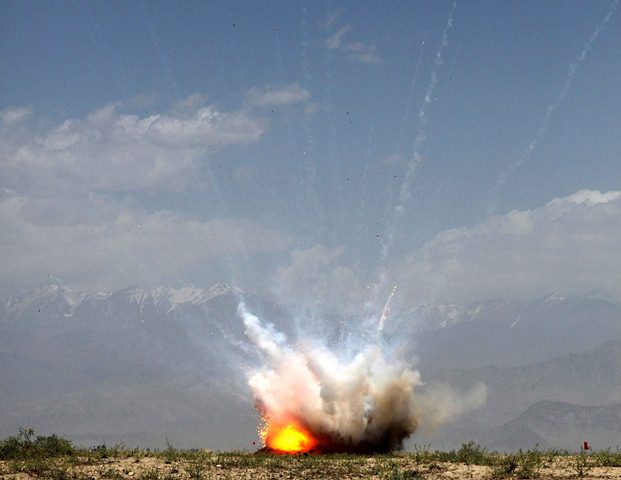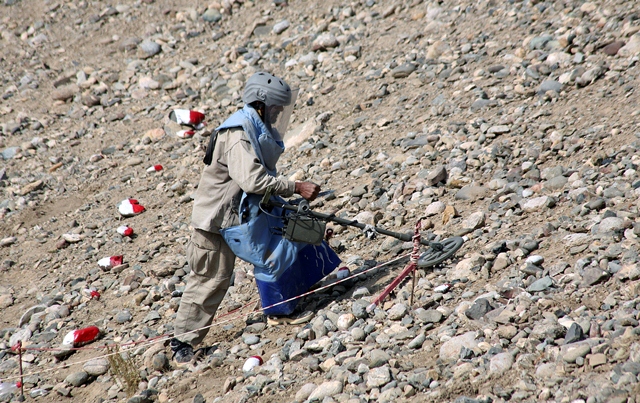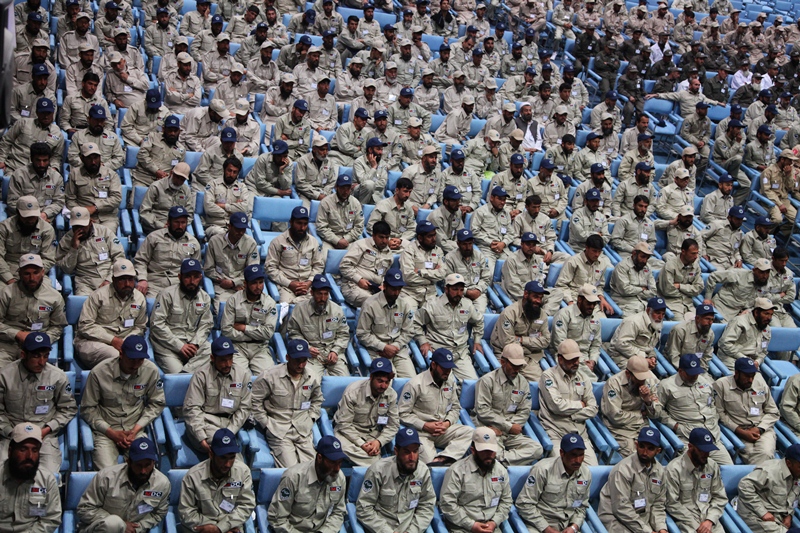KABUL - The Government of Afghanistan has issued an appeal to the international community for funds for the country’s mine action programme which has experienced a 25 per cent drop in its funding this year compared to last year, according to the United Nations-supported Mine Action Coordination Centre of Afghanistan (MACCA).“I appeal to your government to consider supporting mine action in Afghanistan,” wrote Afghanistan’s Second Vice President, Mohammad Karim Khalili, in letters recently sent to the countries’ Permanent Missions to the United Nations in New York, according to a news release from MACCA.
Funds can be channeled to the programme through the Afghan Ministry of Finance, through the UN Voluntary Trust Fund for Mine Action or directly to the implementing partners,” the Second Vice President added.
The underfunding, MACCA stated in its news release, will “put at risk Afghanistan’s commitment” to becoming mine-free by 2023.
Afghanistan has witnessed widespread and indiscriminate use of mines and munitions over more than 30 years of conflict, making it one of the most heavily mined countries in the world. Its mine action progamme – known officially as the Mine Action Programme of Afghanistan (MAPA) – is one of the largest in the world.
A senior official with the UN Mine Action Service (UNMAS), which has supported MAPA since 2002, expressed disappointment over the drop in funding, especially as Afghanistan is at the start of a work plan which will help it achieve mine-free status within ten years.
“We have seen a reduction from many supporters compared to last year and in some cases a complete freeze on funding as is the case with the European Union who were previously very loyal and generous supporters,” said the UNMAS Programme Manager in Afghanistan, Abigail Hartley. "We are advocating strongly and hope they will reconsider.”
Despite the past gains in de-mining, Afghanistan still has over 4,500 areas, covering some 521 square kilometres of land, contaminated with mines and explosive remnants of war (ERW), affecting 1,628 communities, according to MACCA.
In its annual flagship report released last month, MAPA said Afghanistan made significant progress by clearing over 1,900 hazardous areas, covering 112 square kilometres of land, during the Afghan calendar year of 1391, which ended on the Gregorian calendar equivalent date of 20 March 2013. The ‘Annual Report 1391’ of MAPA said it also registered a “tremendous decrease” in civilian casualties as a result of its mine clearance operations which first started 24 years ago.
UNMAS believes that progress is at risk unless MAPA receives adequate funding.
“Actually – if donors were to maintain their support at the same levels as in the previous three years, the problem would be solved in five – not ten – years,” said Ms. Hartley. “Without the necessary financial support, for sure Afghanistan will fail to meet its Ottawa Treaty obligation to be mine free by 2023.”
Afghanistan is a signatory to the Ottawa Mine Ban Treaty – officially known as the Convention on the Prohibition of the Use, Stockpiling, Production and Transfer of Anti-Personnel Mines and on their Destruction – which aims to eliminate anti-personnel landmines around the world. In December last year, the state parties to the treaty approved Afghanistan’s request to extend its 2013 deadline for becoming mine-free by 2023.
UNMAS is supporting the Government in its quest for MAPA funding by highlighting the issue in meetings with donors and in proposal submissions. In addition, UNMAS has written to the Afghan Minister of Finance, Hazrat Omar Zakhilwal, to urge the Government to support the mine clearance effort through the national budget.
“We believe this would send a positive message to the international community and encourage them to continue their support,” added Ms. Hartley.
Owing to the lack of adequate funding, UNMAS said 4,000 Afghan deminers, out of 14,000, have been made redundant over the last six months. “The trained and experienced capacity is there; the equipment is there – all we need are the funds to deliver,” said Ms. Hartley.
Echoing Second Vice President Khalili’s appeal for funds, Afghanistan’s Deputy Permanent Representative to the UN, Mohammad Taqi Khalili, told the UN General Assembly on 1 November that landmines and ERWs are still killing and injuring Afghans.
According to MAPA, some 40 civilians are killed or injured by landmines or ERWs every month in Afghanistan.
“Without UNMAS and the international community’s continuing technical and financial support, Afghanistan will not be able to emancipate itself from the threat of landmines,” said Ambassador Khalili. “These weapons are the greatest threat and enemy to the lives of human beings.”
Related articles:
- UN-backed agency cleared over 1,900 minefields in Afghanistan last year – report
- Ban calls for more progress in eliminating threat of mines, as UN voices support for Afghan efforts






